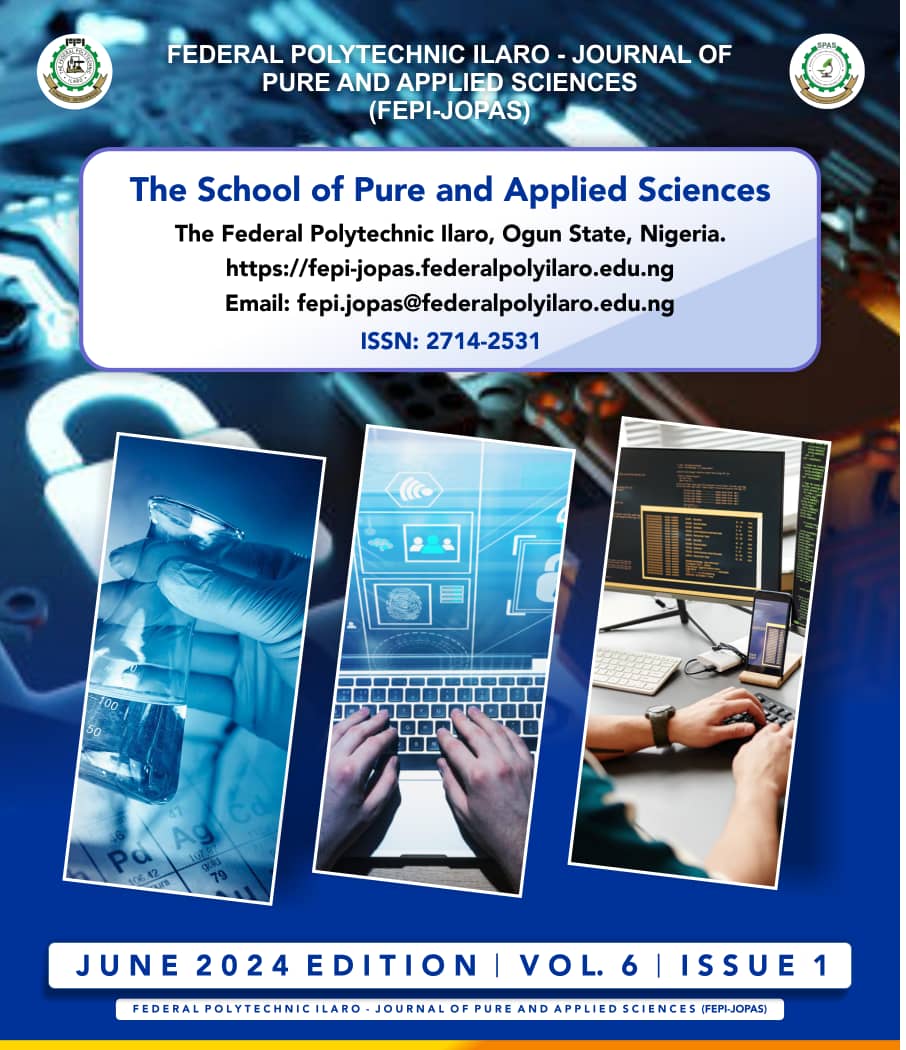Vol. 6 No. 1 (2024): THE FEDERAL POLYTECHNIC ILARO JOURNAL OF PURE AND APPLIED SCIENCES VOLUME 6 ISSUE 1

In recent times, it has become imperative to engage more in collaborative research in the area of pure and applied science to provide long-term solutions to numerous problems in the 21st century. Hence, I am excited to introduce to you the Federal Polytechnic Ilaro—Journal of Pure and Applied Sciences (FEPI-JOPAS) as a platform for the dissemination and unveiling of thought-provoking information and research findings in applied science. I welcome our readers, scientific audience, and researchers’ community to volume 6, issue 1, of this peer-reviewed and accredited multi-disciplinary journal of international repute that is indexed in the Database of African Journal Online (AJOL). FEPI-JOPAS publishes short communication, full-length research work, critical reviews, and other review articles. It archives research information to 21st-century researchers, professionals, policymakers, manufacturers, production staff, research and development personnel, and governmental and non-governmental agencies.
In this edition, the effect of co-fermentation of millet grains with spices (garlic or ginger) on flour properties and porridge quality was investigated by Adebowale and Ajibode. Assessment of the free radical scavenging activity of various solvent fractions of Justicia. carnea, and evaluation and quantification of the phenolic (TPC) and flavonoid (TFC) content in various solvent fractions of the methanolic extract of J. carnea were unveiled by Omotayo and Adeboye. The anticorrosion activity of Launaea taraxacifolia leaves on mild steel in an acid medium was the central focus of the research work of Jesusina and Ajayi. In another study, Olufayo and coworkers examined the impact of Phyllanthus niruri leaf meal (PNLM) on the caecum microbial population and layers chicken's blood profiles during the growth stage. The quality assessment of flour and amala produced from white yam (Dioscorea rotundata), unripe plantain (Musa paradisiaca) and sweet potato (Ipomoea batatas) was carried out by Babalola and co-workers.
In addition, Alaba and Gabriel examined the anthropometric status and cognitive performance of school-age children in Sagamu, Ogun State, Nigeria. This was followed by the design, construction and performance evaluation of a walk-behind driven mono wheel agro-chemical boom sprayer which was the main aim of the research effort of Enamaku and Ogunlade. A review by Ibidapo-Obe and Yusuff highlighted the current state of aquaculture in Nigeria, the challenges faced, and the potential benefits of diversifying fish species. The work of Okosode and Sokale dealt with food preferences and foraging ecology of the black and white mannikin bird (Spermestes bicolor) found in Ilaro, Ogun State, Nigeria. The next study by Gabriel and Alaba assessed the nutritional status and functional capacity of the Elderly in selected communities in Yewa South, Ogun state. The research work of Sangosina and Akinlade described the effect of sex and environmental parameters on the performance and physiology of rabbits. Buoye and Akinbola presented a comprehensive exploration of leveraging blockchain technology to enhance database backup and recovery processes, thereby safeguarding data integrity. Adeyeye and Okedairo explored the acoustic characteristics of non-traditional Agidigbo musical instruments. Another study by Oduwole surveyed the direct effect of moderating variables on behavioural intention to surveying practice. Amao et al. evaluated the effect of clove powder (Syzygium aromaticum) on semen characteristics, haematological and serum-biochemical indices of cocks. The research effort of Adedokun and co-workers aimed to reduce malnutrition in the tropics, and a mixture of sorghum and pigeon peas at ratios: of 100:0, 90:10, 80:20, 70:30, and 60:40%) were co-fermented to produce dried ‘Ogi’ flour.
Furthermore, the efforts of the dedicated Editorial Board members, reviewers, and authors are gratefully acknowledged for the timely delivery of this rich-content edition of volume 6, issue 1 of FEPI-JOPAS. The authors are solely responsible for the information, data, and authenticity of the data provided in their articles submitted for publication in the Federal Polytechnic Ilaro–Journal of Pure and Applied Sciences (FEPI-JOPAS).
We look forward to receiving your manuscripts for subsequent publications. Visit our website (https://fepi-jopas.federalpolyilaro.edu.ng/index.php/journal) for more information, or contact us via email at [email protected]





